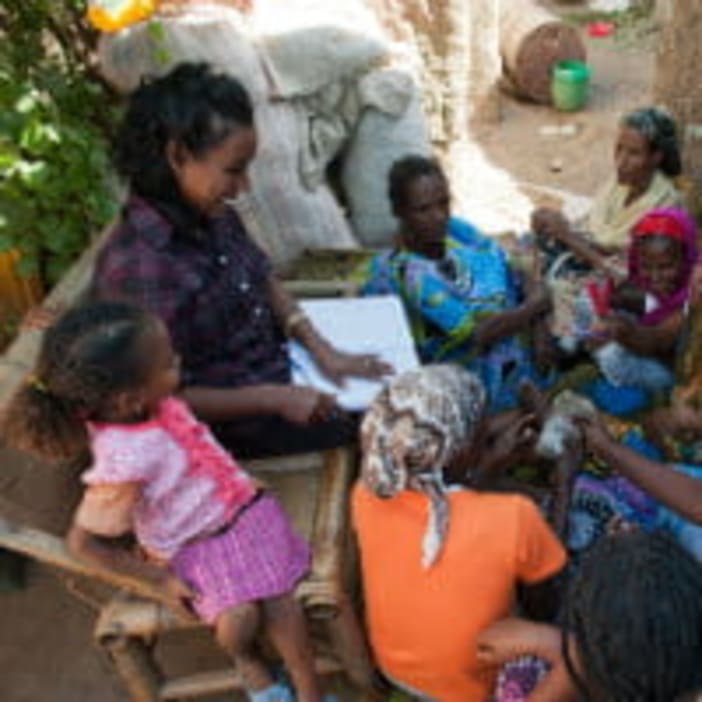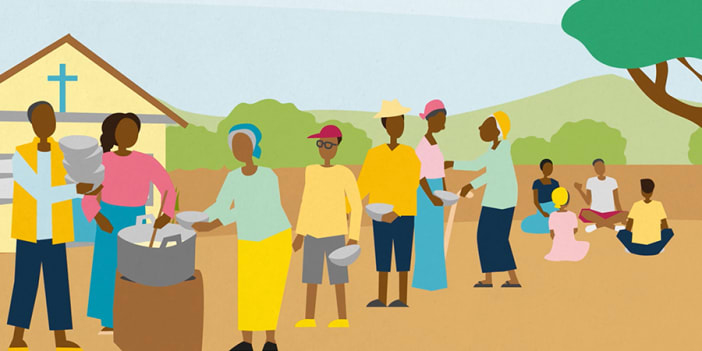Brother Lal, (not his real name) was perhaps the most outstanding Christian worker in the whole region – very committed to his work, active in preaching and teaching in several villages and most reliable.
During the famine, the Bishop was asked if a trusted member of his churches might help with distribution of food and clothing to the needy. It was an easy decision. Brother Lal would take charge and make sure all was done fairly and openly.
After a few months the Bishop began to hear worrying reports. Villagers from one location complained that no clothes reached them. Several people commented that Brother Lal was extending his house and had bought a shop! How did he do that on his poor salary? An aid official reported that tins of meat, donated by his organisation, were on sale in the market.
On the wrong track
To cut a long story short, instead of serving God, full time trading is now Brother Lal’s main priority. The Bishop very much regrets the loss of a fine worker who cannot easily be replaced. He also worries about Lal, personally and spiritually.
The first disaster (famine) helped produce a second disaster (for the church and for Brother Lal).
Temptations and pressures
This story serves to illustrate a problem which is becoming all too common as disasters and famines become more frequent. Relief agencies need trustworthy and capable people to oversee the distribution of aid. The churches ‘lend’ their best people. But for various reasons, some of these do not come through the test well. What are the reasons for this?
First, the temptations and pressures are enormous. The poorly paid worker suddenly has great resources at his disposal. There is also pressure from the rich and powerful who wish to buy the goods which are intended for free distribution. They may make threats, offer bribes or simply persuade the worker to give them what they want.
Secondly, such workers feel their responsibility towards their own families. Relatives beg for a bit extra. How can they neglect their own people? Does not the Bible tell us to provide for our own families?
Thirdly, church members may ask for extra help. Should we not help our Christian brothers and sisters?
Working with wisdom
The weight of these and other pressures may be enormous – too much for most people to bear on their own. So what can be done to prevent this? An old proverb says, ‘The greatest evil is the corruption of the best.’ I would encourage church leaders to consider the following…
- Be cautious in providing workers for relief work. The apostles clearly saw that those with great gifts of preaching and prayer should not be diverted from their calling to do work that others could do (Acts 6:1-7). If, after prayer, it seems right for church staff to become involved, be sure to choose wisely.
- Those chosen to help should be equipped with adequate training (for example, in administration, recordkeeping and communication), or provided with suitably skilled people to work with them. Teamwork is less risky than depending on one person!
- State in writing the responsibilities and duties of all concerned, so that all know their responsibilities.
- Encourage openness and frequent reporting. Reports and accounting should be open to examination, not only by church and relief agency officials, but also by the community.
- Support the workers by prayer and visiting. Take an interest in their work. If suspicions arise, discuss them openly with the people concerned, but without judging before the facts are clear. Sometimes those who have remained faithful despite enormous temptations can be terribly discouraged by false accusations and lack of trust.
Preparing for the unexpected
So often the church is thrust into relief work without a chance to prepare for it – disasters usually occur without much warning! But staff can be trained to be better administrators, to know how to keep records and accounts, to learn how to lead meetings and to be open and accountable. Investment by churches or donor agencies in developing people in this way is very important. It can help prepare the church or local community workers for unexpected situations – as well as helping them perform their normal daily work better. But all this will be of little value unless backed up by solid Christian teaching, Bible study and prayer which help to develop and strengthen the Christ-like character.
What about the women?
'African women have a better understanding of economics than men; on the whole they are far better business people! So why not put women in charge of church and project funds? Once men accept the idea of women treasurers, the problem of poor bookkeeping and resultant fraud could be solved!’
The comment of a Senegalese man at a recent RURCON conference in Senegal
The author worked in Uganda for many years with Crosslinks (formerly BCMS).









